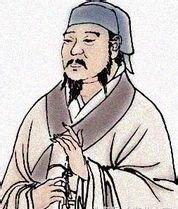Edit; Spring Mountain

Xun (荀狀), courtesy name Xunzi (荀子), Xunzi (c. 313 BC – 238 BC), courtesy name, Ziqing, Huaxia (Han), and Zhao at the end of the Warring States period. Famous thinker, writer, politician, and was revered as "Xun Qing". During the Western Han Dynasty, because of the avoidance of the Han Xuan Emperor Liu's inquiry, because the word "Xun" and "Sun" were connected by ancient sounds, it was also called Sun Qing. He served three times as a sacrificial liquor at the Qi state's Jixia Xue palace, and later served as the commander of Chu Lanling (chu lanling county in present-day Shandong).
In the Xunzi Treatise on Etiquette, it is said that "the ceremony, the heavens, the lower things, the honor of the first clothes and the master of the long jun, are the three books of the ceremony." This means that there are three kinds of origins of rites, heaven and earth are the origin of life, ancestors are the origin of the race, and kings and chiefs are the origins of politics. Without heaven and earth, there would be no life for all things, no races and countries without ancestors, and no politics and stability without kings. Therefore, the liturgy serves the heavens above and the earth below, honoring the ancestors, and solemnizing the monarch. However, Xunzi ignores another element here, that is, the teacher is the source of knowledge, and there is no knowledge. Society cannot be indoctrinated and promoted, so in ancient times, people enshrined the tablets of "heaven, earth, king, relative, and teacher", which shows the prominent position of the teacher in people's hearts.
In the Xunzi Persuasion, it is said that "where to start and where to end learning, the answer, in its order, is to begin with the Book of Shang and end with the reading of the Book of Rites, in its sense, from becoming a bachelor to becoming a saint." He also said, "If you accumulate sincerity and persevere, you can drill into it, and you must learn until you die, and this is the end." Xun Zi was instrumental in his teaching of the Confucian classics. Confucianism in the Han Dynasty not only derived "etiquette" from Xunxue, but also "poetic classics" and even "Spring and Autumn Studies" were related to Xunxue. Qing Ru Wangzhong's "General Theory of Xun Qingzi" believes that "xunqing's learning is due to Kong's family, and it is especially credited to the sutras", and has made a detailed examination of Xunzi's "transmission of the scriptures", which is basically agreed by scholars who study the history of classics.
The contemporary Confucian Xu Fuguan also highly praised the position of Xunzi in the history of scripture. Han Fei and Li Si were both his disciples, and the "Records of History" records that Li Si "learned the art of emperors from Xun Qing", and Xun Zi's "art of emperors" was reflected through Li Si's later practice. Su Shi of the Northern Song Dynasty said in the "Treatise on Xun Qing": "Xun Qing Ming Wang Dao, Shu Li Le, and Li Si with his learning chaos the world." Xun Zi was the first to use the name of the endowment and write the endowment in the Q&A style, and together with Qu Yuan was known as the "Ancestor of the Word Endowment". Xun Quan is worthy of being a great thinker and outstanding writer and educator in ancient China. One of the representative figures of Confucianism.